Discover the latest news and updates about the Politics and Public Governance research group: new publications, activities and events, our members in the news,...
2025
17 Dec 2025 | New publication - We are proud to announce the publication of the third edition of Performance Management in the Public Sector by Wouter Van Dooren, Geert Bouckaert, and John Halligan (Routledge, 2026). This fully revised edition provides a comprehensive exploration of performance management in the public sector, incorporating nearly 200 new references from the latest decade of performance management research. Moving beyond the traditional New Public Management paradigm, the book critically examines how performance measurement, incorporation, and use can be purposefully designed to enhance public management and governance. With a strong didactical focus, it offers guidance on designing performance management systems that align with contemporary challenges and policy needs. The book continues to bridge theory and practice, drawing on comparative insights and real-world cases from across administrative systems. The third edition further consolidates the book’s position as a core reference for students, researchers, and professionals seeking to design functional performance management systems.
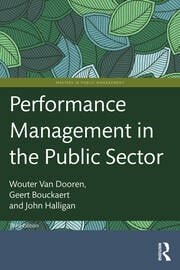
30 Sep 2025 | New publication "Generative Content Analysis for Policy Research: Comparing LLM Reliability in Analyzing Institutional AI Discourse" published in IEEE Conference Proceedings for the 2025 25th International Conference on Control Systems and Computer Science (CSCS), authored by Cosima Rughiniș, Ștefania Matei, and Andreas Corcaci.
- Abstract: This study examines the methodological implications of using large language models (LLMs) as research assistants in coding and qualitative content analysis. We compared how ChatGPT-4o and Gemini 2.0 perform when independently coding and extracting content from university generative AI policies according to a framework of ten "vocabularies of AI competence." Our dataset comprised official AI guidelines from 33 leading global universities. Quantitative analysis of inter-coder reliability indicated significant variation across conceptual categories, with high convergence for vocabularies related to academic integrity and information accuracy, but divergence in detecting other concepts such as AI dependency. Qualitative comparisons of extraction outputs demonstrated methodological trade-offs between models, with ChatGPT-4o providing fewer but contextually richer extractions versus Gemini 2.0's more numerous but briefer quotations. These findings have important considerations for researchers employing LLMs in qualitative analysis: domain-specific reliability assessment, complementary multi-model approaches to balance analytical depth and breadth, and acknowledgment of model-dependent dataset composition.
25 Sep 2025 | New article on "Trust during crisis: unveiling the role of perceived procedural transparency", authored by Susana Coroado and Jakob Frateur, published in Public Managment Review.
- Abstract: This article investigates how citizens’ perceptions of procedural transparency impact political trust during crises, using COVID-19 as a test case. It focuses on individual perceptions rather than actual government transparency, emphasizing the decision-making process over the inputs or outputs of decisions. The study aims to contribute to the debate by examining the extent to which citizens value decision-making transparency during crises, how they have perceived transparency during crisis management, and the latter’s impact on political trust by employing a survey of six European countries. The findings suggest a strong relationship between procedural transparency and trust, with citizens ranking transparency as the key value in crisis management.
17 Sep 2025 | The Politics and Public Governance Research Group and the Chair of Crisis Governance, in collaboration with the GOVTRUST Centre of Excellence, at the University of Antwerp have held a seminar on Networks in Public Administration and Policy with esteemed guest Prof. Naim Kapucu (University of Central Florida). In his engaging lecture, Prof. Kapucu has discussed how public administration questions can be tackled through network approaches. Particularly inspiring were the example of how to construct an Affiliation Network and the insights into systemic resilience.
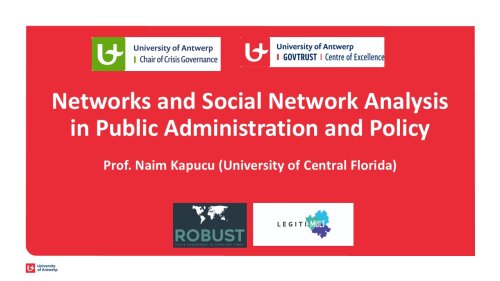
2 Sep 2025 | New article on "Estrangement, embodiment and entanglement: Putting agonistic planning into practice through Urban Drama Labs", authored by Cecilie Sachs Olsen, Krzysztof Janas, Lisa De Roeck, Barbara Koole, Cato Janssen, Merlijn van Hulst and Celine Motzfeldt Loades, published in Urban Studies.
- Abstract: This paper explores how agonistic conflict can be made productive for urban governance by means of applied theatre. Discussing the development and implementation of Urban Drama Labs in the cities of Drammen (Norway), Gdynia (Poland), Tilburg (the Netherlands) and Genk (Belgium), the paper introduces three analytic principles for understanding the potential of applied theatre to put agonistic planning into practice: estrangement enables new perspectives on the conflict at hand by defamiliarising what is taken for granted; embodiment foregrounds the role of multiple senses, emotions and affect to stir engagement in conflictual situations; and entanglement moves beyond static oppositions by foregrounding how interests, roles and identities are woven together. While acknowledging the challenges of integrating Urban Drama Labs in planning in terms of navigating tensions between contingency and predictability, trust and control in procedural settings, the paper proposes new pathways for advancing agonistic approaches in participatory urban governance.
30 Jul 2025 | New open access article on "Advancing Robust Governance in Turbulent Times: The Role of Multi-Level Governance, Hybrid Governance, and Negotiated Societal Intelligence", authored by Jacob Torfing, Tina Bentzen, Tiziana Caponio, Susana Coroado, Scott Douglas, Steven Nõmmik, Tiina Randma-Liiv, Chiara Russo, Eva Sørensen, and Koen Verhoest, published in Public Administration.
- Abstract: New research argues that robust governance based on flexible adaptation and proactive innovation is needed in order to uphold core public functions, purposes, and values in times of societal turbulence. However, we have limited knowledge of the conditions for enhancing robust governance. To fill that knowledge gap, we ask: How can multi-level governance, hybrid governance, and societal intelligence contribute to the development of robust responses to the proliferation of complex and turbulent problems? To answer this pertinent question, we draw on relevant literatures to conceptualize each of the three governance factors and develop a set of theoretically derived conjectures about their impact on robust governance. We also discuss the combined effects of the three governance factors as well as the limits to robust governance. Finally, we draw some lessons for practitioners and sketch out an agenda for further research.
17 Jul 2025 | We are proud to share that our colleague Rik Joosen was awarded a prestigious Veni Grant by NWO (Dutch Research Council) for groundbreaking research on the role of interest groups in regulatory compliance. The grant will fund four years of research and will be conducted at the Institute of Public Administration at Leiden University (Netherlands). We congratulate Rik on this outstanding achievement and look forward to the exciting research that will follow!
- Project summary: Interest groups play a key role in how companies relate to laws and regulations, for instance by giving them advice or even by stimulating a certain approach to compliance. Choosing the right strategy requires interest groups to balance the support from the companies they represent with support from citizens and policymakers who want them to commit to societal goals. This project assesses how interest groups navigate this balancing act. The results show in what way interest groups try to affect how their members relate to laws and regulations and under what conditions interest groups pursue different strategies with that aim.
30 Jun 2025 | We are delighted to announce that Louis Meuleman has joined the Politics & Public Governance research group as a guest professor. Dr. Meuleman has a PhD in public administration and an MSc in environmental biology. He brings a unique blend of academic insight and high-level policy experience in (sustainability) governance and metagovernance, public administration reform and sustainability transitions. Until recently, Louis worked at the European Commission, DG Environment, in Brussels, as coordinator Environmental Implementation Review and European Semester. Besides being guest professor at PPG of UAntwerpen, he continues to play a pivotal role in shaping sustainable governance globally, through positions as Vice Chair of the United Nations Committee of Experts on Public Administration (CEPA), Chair of the Scientific Committee of the European Environment Agency (EEA), Chair of Stakeholder Forum for a Sustainable Future, visiting professor KU Leuven (BE), research fellow at Wageningen University (NL), Member of the Board of the Club of Rome EU Chapter, and Director of Public Strategy for Sustainable Development (PS4SD). His influential book, Metagovernance for Sustainability: A Framework for Implementing the SDGs (Routledge, 2018), tests the hypothesis that the implementation of sustainable development, and in particular the 2015 SDGs, requires tailor-made metagovernance or ‘governance of governance’ and offers a framework for the design and management of SDG implementation. At PPG, we are honoured to welcome Dr. Louis Meuleman to the team and look forward to the valuable expertise and international perspective he brings!

17 Jun 2025 | Visiting researcher Sen Lin presented his work in a PPG x GOVTRUST x STRATEGO research seminar. Sen Lin is one of the visiting researchers supported by the STRATEGO Jean Monnet Centre of Excellence. From May until November 2025, he is hosted by the Politics & Public Governance research group and the GOVTRUST Centre of Excellence under the supervision of prof. Koen Verhoest. In the PPG x STRATEGO research seminar, Sen presented his research on "Trust and distrust in government: The interactive effect on public service coproduction".
- Abstract: Citizens’ trust in government is critical for public service coproduction. However, previous studies show conflicting results of the relationship between trust in government and coproduction willingness. This study proposes that the issue may be caused by different understandings of “trust in government”. It adopts a dualistic perspective on trust and distrust to explore how trust/distrust in government and their interplay affect coproduction willingness. Based on four typical coproduction scenarios in urban governance, this study collected 2394 valid responses from urban residents in China via an online survey. The results indicate that trust in government shows a significantly positive relationship with coproduction willingness in all scenarios. By contrast, distrust in government also shows a positive relationship with coproduction willingness, but the impact is slighter than that of trust. Moreover, the positive impact of trust on coproduction willingness decreases as the level of distrust increases. Distrust does not undermine the role of high trust; rather, it can to some extent serve as an alternative motivation for low-trust citizens to coproduce, thereby narrowing the gap in coproduction willingness between low-trust and high-trust citizen. The findings provide a nuanced understanding of the relationship between (dis)trust in government and coproduction willingness and help explain why some citizens, even without distrusting the government, are still unwilling to participate in coproduction. Based on citizens’ levels of trust and distrust, a typology of coproducer is developed to inform future research.
16 Jun 2025 | New article on "Trust in multilevel governance settings: examining the congruence hypothesis for actors in regulatory regimes", authored by Martino Maggetti, Koen Verhoest, Jarle Trondal, Dominika Proszowska & Rahel Schomaker, published in Journal of European Public Policy - available in open access.
- Abstract: This article focuses on trust dynamics across levels of governance in European regulatory regimes, making three contributions. First, it theorises trust relationships in multilevel political orders, by extending and adapting the congruence hypothesis originally developed to explain citizens’ trust in European Union (EU) institutions. Second, it outlines a novel dataset derived from an original survey collected in nine European countries and three sectors: data protection, finance, and food safety. This unique dataset enables an in-depth examination of previously underexplored multilevel trust dynamics of regime actors and the investigation of hypotheses regarding the underlying mechanisms. Third, our findings empirically validate the congruence hypothesis: the perceived trustworthiness of core national regulatory agencies is positively associated with trust in EU-level bodies. Furthermore, our study shows that congruence dynamics are stronger for central regime actors compared to peripheral ones. Sectoral patterns are also highlighted: As expected, congruence dynamics are weaker in recently established regulatory regimes, such as data protection, compared to more institutionalised sectors like finance and food safety. Lastly, congruence is notably stronger for actors from non-EU countries, aligning with our expectations regarding the influential role of heuristics.
6 Jun 2025 | Bastiaan Redert presented at the TEPSA Academy & Skills Lab 2025 in Brussels on “EU Equality and Anti-Discrimination Policy”. Bastiaan Redert led a session on "Navigating LGBTQ+ rights protection in times of increased hostility". The Trans European Policy Studies Association, or TEPSA, is the first European affairs research network. Via their pan-European network comprising 49 leading research institutes in 37 European countries, they bridge the gap between research, policy-making, and citizens.
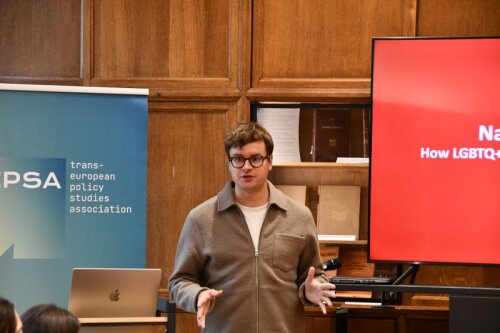
30 May 2025 | Peter Bursens contributed to the 3rd IGCOORD Training School on "Formal and Informal Intergovernmental Relations", taking place 27-30 May at the Institute for Comparative Federalism, Eurac Research in Bolzano, Italy. Peter's session was titled "Vertical coordination in federal systems applied to domestic EU coordination". IGCOORD is a COST Action that aims to generate new insights on how to organise and optimise institutions and processes of intergovernmental coordination. Peter Bursens is Management Committee member of IGCOORD, representing Belgium.
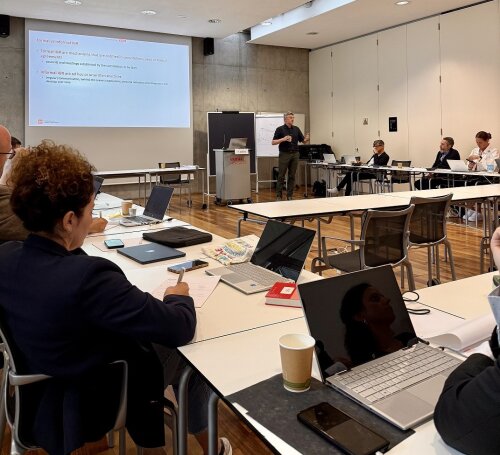
28 May 2025 | New article on "Trust in nursing home services within weak regulatory regimes: the role of information, control and participation", authored by Ixchel Pérez-Durán and Koen Verhoest, published in Public Management Review - available in open access.
- Abstract: What conditions contribute to building trust in services with high levels of opacity, information asymmetries, and vulnerable users? This study examines trust in nursing home service providers through a survey conducted in December 2022, targeting direct relatives of nursing home residents in Spain (n = 1,009). The study shows that the provision of substantive information, vertical control by public authorities, and active involvement of the residents’ relatives positively affect trust and its dimensions (benevolence, integrity, and competence). Greater involvement of families and authorities in overseeing these services can be seen as constructive collaboration that strengthens trust, rather than adversarial surveillance.
27 May 2025 | New article titled "Is That a Threat? How Types of Stakeholder and Reputational Threat Matter for Gaining Influence in Regulatory Rulemaking", authored by Rik Joosen in Regulation & Governance - available in open access.
- Abstract: This paper assesses what type of comments are most useful to what type of stakeholder in gaining influence during public consultations. Theoretically, the paper approaches stakeholders' consultation comments as reputational threats from key audiences that the agency needs to respond to. Different types of threats are expected to carry different weights depending on the type of stakeholders. The analysis is based on a dataset of 73,283 consultation comments left by stakeholders in EASA rulemaking consultations. The findings indicate that it matters what interests pose what kind of threat in regulatory rulemaking. Certain group types become more influential while others lose out when making specific kinds of threats. This extends our understanding of how stakeholders gain influence and what reputational threats are seen as credible by regulatory agencies.
13 May 2025 | New book chapter on "EU competition policy", authored by Bernardo Rangoni and Mark Thatcher as part of the Handbook of European Union Governance.
- Abstract: This chapter argues that dominant characterisations of EU competition policy - whether emphasizing the neo-liberal centralization of powers that allegedly forecloses industrial policy or, conversely, the under-enforcement of these powers - overlook the gradual emergence of an ‘experimentalist’ architecture. We trace the development of this architecture - which co-exists with legally concentrated powers - in the vital case of state aid, beginning with the adoption of a Temporary Framework for state aid measures in 2008 and culminating in its latest transformation into the Temporary Crisis and Transition Framework in 2023. We suggest that these state aid frameworks are temporary in name only. The rapid succession of distinct ‘temporary’ frameworks can be interpreted asreflect the gradual institutionalization of an experimentalist architecture - one that is recursively revised in response to unpredictable and rapidly unfolding crises. Furthermore, we argue that this architecture has served as a means for advancing key industrial policy goals, notably supporting Europe's small and medium-sized enterpreses and the long-term objective of the green transition. We conclude by offering wider implications for EU competition policy - a core part of the EU's economic governance, and a prime example for broader debates about European integration and policymaking.
10 May 2025 | Andreas Corcaci participated in the EUSA (European Union Studies Association) conference, taking place 8-10 May 2025 in Philadelphia. He chaired the panel 'European and International Environmental Governance in the Nexus of Openness and Global Challenges'. In the panel, he presented results of his MSCA project and how concept structures and temporal configurational analysis can help make sense of the complex processes underlying reactions to decisions on environmental obligations beyond the nation state. As part of another panel on 'Politicizing and contesting European integration', he also presented methodological work on how time can be integrated into concept structures formally as a basis for temporally sensitive social research.
22 April 2025 | New article about "How the European Union reconciles uniform regulation with legitimate diversity: towards a tighter experimentalist governance architecture", authored by Jonathan Zeitlin and Bernardo Rangoni in Journal of European Public Policy - available in open access.
- Abstract: Across multiple policy domains, the EU increasingly faces the challenge of balancing uniform regulation in integrated markets with accommodating legitimate diversity among member states. Such uniform rules are crucial to preventing regulatory arbitrage, ensuring a level playing field, and fostering market integration. But diverse socio-economic conditions, institutional frameworks, and political preferences across member states demand adaptability in implementing these rules to maintain social acceptance. These contrasting pressures challenge familiar approaches to accommodating diversity such as differentiated integration, differentiated implementation, and experimentalist governance. In this paper, drawing on comparative analysis of four key regulatory domains – electricity, banking, pharmaceuticals, and competition – we argue that the EU is finding a promising solution to this widespread dilemma through a more tightly integrated experimentalist governance architecture, combining synchronic uniformity with diachronic revisability: uniform rules are applied across the EU, yet are developed and revised based on inclusive review of local implementation. This paper contributes to broader debates on EU governance by highlighting the advantages of this tighter experimentalist architecture over other approaches, showing how it ensures that uniform rules are also socially acceptable.
12 April 2025 | New article on "How to explain citizens’ declined political trust during the COVID-19 pandemic: a time-series qualitative comparative analysis (TsQCA)", authored by Jakob Frateur, Peter Bursens, Patricia Popelier & Susana Coroado (as part of the LEGITIMULTproject), published in Comparative European Politics - available in open access.
- Abstract: The COVID-19 pandemic gave a new impetus to the study of citizens’ political trust in times of crisis. Especially because trust is seen as an important precondition for citizens’ compliance with crisis measures, research into the determinants of citizens’ political trust became highly relevant. Contrary to trust research during previous crises, existing studies mostly focused on the beginning of the pandemic, when political trust increased in (almost) all EU countries, and less so on what happened after. Recently, this changed, and the aftermath of the increase gained more interest, but such research remains scarce and is mainly based on single country studies at the citizen level. We contribute to the existing literature by studying the decline in political trust between the summer of 2020 and the winter of 2021, when the pandemic peaked again. Through time-series qualitative comparative analysis, we study the (combinations of) conditions under which trust decreased in 28 European countries, including the increase over time in policy stringency and mortality, at the presence/absence of contestation and at the general level of trust in a country as conditions. We present three solution paths to explain the decline in trust which we study further in five in-depth case studies.
28 Mar 2025 | New article titled "Engineering representation in multilevel democracies: The Belgian case illustrating reflections on bicameral systems", authored by Jakob Frateur, Petra Meier and Peter Bursens, published in Gestión y Análisis de Políticas Públicas.
- Abstract: Objectives: In federal systems both the people as a whole (demos) and the statespeople (demoi) need to be represented, be it in a unicameral or bicameral set-up. In Belgium, this is increasingly debated, to the extent that the abolition of the second chamber is on the political agenda. What are the theoretical and empirical alternatives to organize representation in federal systems, and to what extent can they be applied to the Belgian federation? While literature on federal systems and most federations search for a more optimal representation of the demoi, Belgium is confronted with the opposite challenge: how to guarantee the representation of the demos in a set-up that favours representation of the demoi. Methodology: This is a theoretical and reflective text based on federalism theory and insights from, among others, EU studies. Results: In this article we argue that the solution to balance this representation can be both unicameral and bicameral. The crux in either is a change in the election of the parliamentarians representing the demos. This could be achieved by electing a part of the Chamber of Representatives through a nationwide, federal circumscription. Conclusions: The main take-away is the need to pay more attention to the representation of the demos at the federal level, especially in multi-level governance systems characterized by devolving tendencies.
14 March 2025 | New article titled "Blue Nature-Based Solutions in marine and coastal EU policies: Challenges, recommendations and policy opportunities throughout the policy cycle", authored by Lise Frehen, Gianluca Ferraro and Pierre Failler published in Marine Policy.
- Abstract: The paper focuses on the use of Nature-based solutions (NBS) in European marine and coastal governance – also called marine or blue NBS. Such solutions appear to be promising tools to deal with interdependent challenges such as climate change adaptation, biodiversity conservation and restoration, and sustainable development. Numerous research projects have demonstrated their utility and investigated the best ways to implement them. In addition, NBS are supported by international networks and agreements, and advocated by actors active at the international and European Union (EU) levels. However, blue NBS are mostly absent from EU policies (directives and regulations) and national, regional and local implementation of those policies. In this paper, barriers to the uptake of NBS at each step of the policy cycle are investigated: agenda-setting, policy formulation, decision-making, policy implementation, and policy evaluation. Policy recommendations and related EU policy opportunities for each of these steps are then presented.
12 March 2025 | Dominika Proszowska on vaccines and vaccine hesitancy 5 years after pandemic in an article in Euractiv.
11 March 2025 | Visiting researcher Federico presented his work in a PPG x STRATEGO research seminar. Federico Cuomo is one of the visiting researchers supported by the STRATEGO Jean Monnet Centre of Excellence. In February and March 2024, he is hosted by the Politics & Public Governance research group under the supervision of prof. Wouter Van Dooren. In the PPG x STRATEGO research seminar, Federico presented a draft book chapter with the preliminary title "How can localities foster robust governance? The case of school closures in Estonia, Belgium, and Italy". The chapter is written together with Wouter Van Dooren and Chiara Russo (UAntwerpen) and several other researchers in the framework of the EU-funded ROBUST project.
- Abstract: As national governments were trying to contain the spread of the coronavirus SARS-CoV-2, many European countries implemented school closures as part of emergency response strategies. Whether taken through the consultation of epidemiology experts or a more diverse set of actors, this decision had considerable consequences both for the children – and their cognitive and social skills, mental and physical health – and their parents. While the magnitude of such crisis ramifications is partly still unknown as we witness children born during the pandemic now starting their formal education trajectories, it is clear that it is within the local level that we can recognize the most robust efforts to mitigate context vulnerability and preserve children’s wellbeing. More specifically, this chapter argues that it is within multi-layered networked localities that we can observe inspiring examples of how to adapt and innovate in the face of the turbulence brought forward by school closures. We understand multi-layered networked localities as clearly delineated geographical areas where it is possible to observe the interactions of crisis responses from the local, national, and international level (Torfing et al., 2021). It is indeed through established policy field networks, actors’ variety and openness, and adaptation and innovation of tools, that the consequences on children’s well-being were limited and counterbalanced. Employing illustrations from three European countries – Estonia, Belgium, and Italy – this research underlines the essential role of localities in robust crisis governance. This also implies moving beyond the focus on the local government, to encompass the whole range of interconnected crisis responses implemented in a certain geographical area by a multitude of actors working together towards the same goal: uphold key public functions, goals and values – such as quality education and children’s wellbeing – by transforming the delivery of public services.
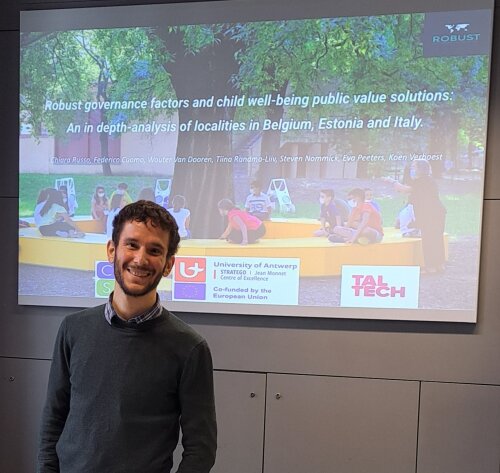
8 March 2025 | Professor Petra Meier talks in 'Het Nieuwblad' about the increasing trend of microfeminism.
28 Feb 2025 | New article titled "Financialization beyond partnerships: Real estate investment trusts in elderly care", authored by Simon Demuynck and Prof. Dr. Wouter Van Dooren published in International Review of Administrative Sciences.
- Abstract: The financial services sector plays an increasing role in the public management of social services. Yet, in contrast to well-studied arrangements such as public–private partnerships and social impact bonds, the ways in which the public sector drives financialization beyond these partnerships remain underexplored. We study the involvement of the financial industry in providing real estate for public services. Our case involves real estate investment trust (REIT) engagement with elderly care in Flanders, Belgium. We analyzed 68 annual reports by REITs and conducted 43 semi-structured interviews with key stakeholders. We show that the participation of REITs in social services is increasing significantly. Public governance mechanisms are fueling this form of financialization rather than slowing it down. The result is a form of state-led financialization with little critical scrutiny.
20 Feb 2025 | Prof. Dr. Petra Meier has recently become a member of the Royal Flemish Academy of Belgium for Science and the Arts (KVAB). This is an association consisting of artists, business leaders and scientists and it entails a lifetime membership. Members join one of the following four classes: Natural sciences, Arts, Technical Sciences and Human Sciences. Petra Meier belongs to that latter class.
24 Jan 2025 | Prof. Dr. Petra Meier has been awarded the Francqui Chair at UCLouvain, Belgium. The Francqui Chair is a recognition for academics from other universities who excel in their field. The holder gives a series of lectures, shares their expertise, and stimulates academic collaboration. The mission of the Francqui Foundation is to promote excellence in the disinterested fundamental research by fostering higher education and scientific advancement in Belgium. The Francqui Chair, existing since 1933, is one of the cornerstone initiatives of the Foundation. This Chair encourages collaboration and exchanges between (mostly Belgian) universities. This, in turn, enriches academic environments, advances academic excellence and interdisciplinary research, and also contributes to strengthening the different universities’ reputations.
As part of the Francqui Chair, Petra Meier will teach a lecture series. The inaugural lecture is titled "Démocratie et pouvoir de la représentation", and will take place on Wednesday 12 February 2025, 11h00 at Aula Magna, Foyer royal in Louvain-la-Neuve. More information about the lecture series.
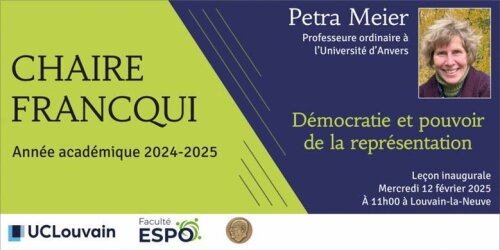
24 Jan 2025 | Prof. Dr. Koen Verhoest presented and discussed his research within the Horizon Europe TIGRE project on "Trust and Distrust in Governance and Regulation in Europe" in a KUDoS Seminar on 24 January 2025. KUDoS is the Kozminski University Doctoral School, part of Kozminski University in Warsaw, Poland. The seminar explored challenges in researching trust across sectors like financial regulation, food safety, and data protection, combining innovative methods such as surveys, social network analysis, interviews, and legal coding. The session sparked lively discussions, with participants asking numerous questions and sharing thoughtful comments. The level of engagement was truly remarkable, and it showcased the depth of interest in this critical topic. Following the seminar, participants had the opportunity to network, exchange ideas, and continue the conversations in a more informal setting. The seminar was made possible thanks to the NAWA - Polish National Agency for Academic Exchange, who supported the initiative.
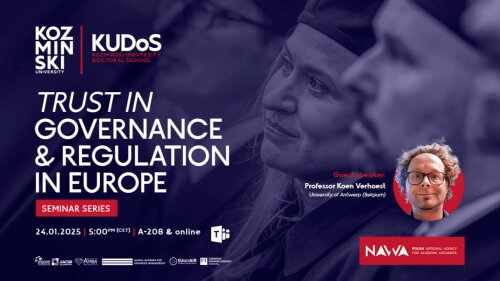
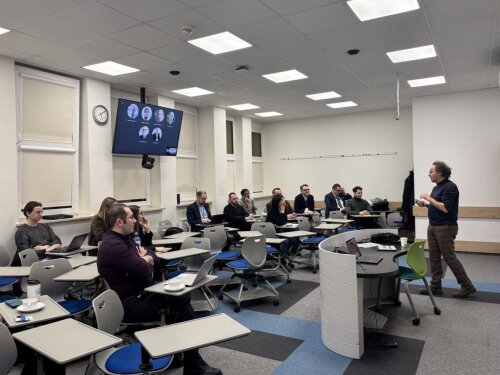
21 January | New article titled "Does the Background of the Regulator Matter? The Role of Expertise and Diversity on the Perceived Competence of Regulatory Bodies", authored by Ixchel Perez-Duran, Yannis Papadopoulos, Bastiaan Redert, and Juan Carlos Triviño-Salazar published (open access) in Regulation & Governance.
- Abstract: This paper examines expertise and professional diversity within new (agencies and central banks) and traditional (ministries) regulatory bodies (RBs) and assesses their effect on the perceived competence of RBs. In particular, we address the following research questions: To what extent do members of RBs have expertise and display diversity in terms of their professional trajectories? How do expertise and professional diversity affect the perceived competence of RBs? By using two empirical sources of data, this article provides core information on the educational and professional profiles of RBs staff. In addition, the paper provides evidence that both professional diversity and expertise among RBs do not have a significant effect on their perceived competence by regime actors. However, the study also suggests that regime actors that are more closely aligned to the professional trajectory of RB members (i.e., other regulators and members of the executive branch) tend to have a more positive perception of the competence of RBs. Conversely, societal actors tend to be more critical toward RBs, suggesting that a lack of a shared language creates a greater distance from the regulators.
13 January | Prof. dr. Hans Bruyninckx talks in an article of 'Trends' about the consequences of climate change and how both national and international politics should deal with it.
2024
19 December | Prof. dr. Ria Janvier explains in 'Het Laatste Nieuws' the seven new measures on pensions that will come into force in 2025.
9 December | Prof. dr. Ria Janvier is interviewed by 'De Morgen' about future pension reforms by the next Belgian federal government and their consequences.
3 December | New article titled "How do elite core actors assess trust in national and EU authorities? The varying role of generalised trust at diferent governmental levels", authored by dr. Moritz Kappler, prof. dr. Rahel Schomaker, dr. Edoardo Guaschino and prof. dr. Koen Verhoest, published in Comparative European Politics.
- Abstract: In this paper, we position generalised trust as central to the debate on elites’ assessments of trust in EU multi-level governance. We leverage one of the most influential factors in explaining political trust in single-government studies to understand variations in trust towards political authorities at various levels. Departing from existing studies, we hypothesise the dual nature of generalised trust: while it influences how individuals assess their trust in political authorities, its impact varies depending on different degrees of perceived similarity of these authorities at either the national or the EU level. To test our hypotheses, we conducted an elite vignette experiment involving 567 decision-makers from public and private stakeholders within regulatory regimes in eight countries. The results reveal a significant positive effect of generalised trust on political trust when evaluating a national-level regulatory agency. However, trust assessments of EU-level regulatory agencies appear to be largely unaffected by generalised trust levels. Furthermore, we observed notable differences in trust assessment between private and public stakeholders, reinforcing our argument that similarity and community belonging underlie the influence of generalised trust on political trust. Our study suggests that EU-level political authorities may derive less benefit from high levels of generalised trust, compared to national political authorities. However, in instances where generalised trust is low, political authorities at the EU level have comparatively more opportunities to cultivate trust in them.
29 November | Prof. dr. Marijn Hoijtink is in a podcast of BNR where she talks about the use of AI in warfare.
22 November | Prof. dr. Hans Bruyninckx publishes an article in newspaper 'De Morgen'. In this, he explains four gaps of the climate conference in Baku and emphasises which ethical principles should be central in such climate conferences.
15 November | New article titled "A reputational perspective on structural reforms: How media reputations are related to the structural reform likelihood of public agencies", authored by prof. dr. Jan Boon, prof. dr. Jan Wynen, prof. dr. Koen Verhoest, prof. dr. Walter Daelemans and dr. Jens Lemmens, published in the Journal of Public Administration Research and Theory.
- Abstract: Despite recurrent observations that media reputations of agencies matter to understand their reform experiences, no studies have theorized and tested the role of sentiment. This study uses novel and advanced BERT language models to detect attributions of responsibility for positive/negative outcomes in media coverage towards 14 Flemish (Belgian) agencies between 2000-2015 through supervised machine learning, and connects these data to the Belgian State Administration Database on the structural reforms these agencies experienced. Our results reflect an inverted U-shaped relationship: more negative reputations increase the reform likelihood of agencies, yet up to a certain point at which the reform likelihood drops again. Variations in positive and neutral reputational signals do not impact the reform likelihood of agencies. Our study contributes to understanding the role of reputation as an antecedent of structural reforms. Complementing and enriching existing perspectives, the paper shows how the sentiment in reputational signals accumulates and informs political-administrative decision-makers to engage in structural reforms.
4 November | New article titled "Performing policy conflict: A dramaturgical analysis of public participation in contentious urban planning projects", authored by Lisa De Roeck and prof. dr. Wouter Van Dooren, published in Policy Sciences.
- Abstract: Whether endemic or overt, conflict is an intrinsic part of policymaking. Public participation promises to give a place to those conflicts in a more inclusive and productive way. Previous research has primarily focused on the substance and discourse of conflict, studying what conflicts are about and how actors give meaning to conflicts. Less attention has been given to how conflicts are enacted and performed when citizens and the state meet. Using a dramaturgical approach, this paper explores how the performances, staging practices, and scenography of public participation influence policy conflicts. The research concentrates on two contentious urban projects in the Belgian city of Genk, employing ethnographic observation of participatory moments to expose the performative elements of participation. The analysis uncovers the artifacts and communicative methods that narrow the conflict scope, determine the micro-politics of the participatory meetings, and influence whose voices are heard. Using a dramaturgical analysis framework sheds light on some underexplored, micro-level dynamics of participatory efforts that may limit the scope of policy conflict. Understanding these micro-mechanisms is essential for a more inclusive and equitable urban transformation policy.